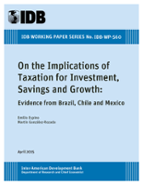On the Implications of Taxation for Investment, Savings and Growth: Evidence from Brazil, Chile and Mexico
Date
Apr 2015
This paper explores the qualitative and quantitative implications of taxation for growth and savings in three Latin American countries: Brazil, Chile and Mexico, studying a small open economy in the context of an endogenous growth model where the domestic interest rate depends on the level of domestic debt. The model's parameters are calibrated to the Brazilian, Chilean and Mexican economies. The findings suggest that, in order to implement the optimal tax regime, Brazil must tax capital at a considerably lower rate than at present. Consumption should be heavily taxed in Brazil and Mexico and optimal labor taxes should be lower than actual taxes in Brazil and Chile. However, while sub-optimal taxes seem to imply lower long-run growth in these three countries, low saving rates do not seem to be a direct consequence of sub-optimal taxation.



